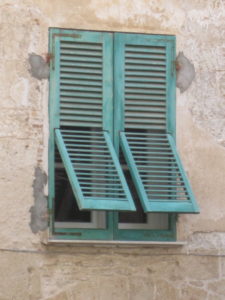
PHOTO: Mary van Balen
Friday, October 11, is the 57th anniversary of the opening session of Vatican II. It is also the fifth time the Catholic church celebrates the feast of Saint John XXIII.
Almost 12 when the Council began on October 11, 1962 and a student in a Catholic school, I knew something important was happening. This was partly because the teachers talked about it: the first council called in nearly 100 years. The pope said it was time to “Throw open the windows of the church and let the fresh air of the Spirit blow through.” No one knew what it would look like, but we knew change was coming.
But, more than the talk and the tangible changes, it was the man himself who stirred my heart and imagination from the start. The rotund Angelo Giuseppe Roncalli, whose parents were peasant farmers, greeted the world with a smile when he emerged on the balcony and said his name was John. He looked happy, and approachable, like a grandpa. A little girl when he was elected, I liked him. I liked to see pictures of the pope who laughed and seemed so full of life.
Much is written, and rightly so, about the accomplishments of his short papacy and profound effects of the council he called. His ability to see good in the contemporary world moved the Catholic church beyond its deep distrust of modernity. His humility, hope, positive view of the human person, and the recognition of the universal call to holiness speak to me as I ponder his life today.
Here are a few quotes that I’d like to share.
“Prayer is the raising of the mind to God. We must always remember this. The actual words matter less.” There are times when we can be still, recite favorite prayers, pray with our communities at Mass, other liturgical celebrations, or simply around the table. But there are also times when we can’t. When our work or families or situations demand our attention. When we are emotionally worn out or just trying to survive. But we can for a moment, “raise our minds to God.” No words needed.
In his spiritual diary, Journal of a Soul, St. John XXIII wrote: “I am not St. Aloysius, nor must I seek holiness in his particular way, but according to the requirements of my own nature, my own character and the different conditions of my life.… If St. Aloysius had been as I am, he would have become holy in a different way.”
And there are as many ways to become holy as there are people. Vatican II reflected this wisdom in affirming the universal call to holiness. We each have a spark of the Divine dwelling within. God has placed the Spirit in our hearts and depends on us to give it away in the work of transforming the world, in Christ’s work of bringing the kingdom. We won’t be St. Aloysius or John the XXIII or any other saint you can name. But like them, we can be faithful to the unique expression of Divinity that we are made to be.
“Now more than ever, certainly more than in past centuries, our intention is to serve people as such and not only Catholics; to defend above all and everywhere the rights of the human person and not only those of the Catholic Church; it is not the Gospel that changes; it is we who begin to understand it better….The moment has arrived when we must recognize the signs of the times, seize the opportunity, and look far abroad.”
These words are as true now as they were when spoken from his deathbed on June 3, 1963. We are called to defend the rights of all human beings, people of any faith or none; people everywhere, including on our southern border and in places of poverty, war, violence, and natural disasters. And we are always beginning to understand the Gospel better. It’s part of the evolution of spirituality.
As we remember Pope John XXIII and the Council he convened, let us heed his call to recognize the signs of the times, seize the opportunity, and find hope and courage to look far abroad.
© 2019 Mary van Balen


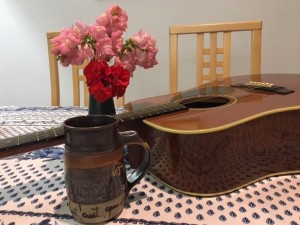 Originally published in The Catholic Times, October 16, 2016
Originally published in The Catholic Times, October 16, 2016
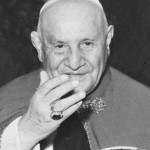 Originally published in The Catholic Times, Oct. 13 Vol. 64:2
Originally published in The Catholic Times, Oct. 13 Vol. 64:2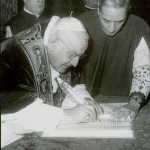
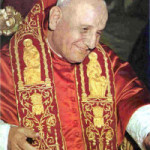 His homily at Sunday’s opening mass warned of the possibility that those charged with nurturing God’s people can bring harm instead out of their self interest, greed, and pride: “God’s dream always clashes with the hypocrisy of some of his servants. We can ‘thwart’ God’s dream if we fail to let ourselves be guided by the Holy Spirit,” Pope Francis said. “The Spirit gives us that wisdom which surpasses knowledge, and enables us to work generously with authentic freedom and humble creativity.”
His homily at Sunday’s opening mass warned of the possibility that those charged with nurturing God’s people can bring harm instead out of their self interest, greed, and pride: “God’s dream always clashes with the hypocrisy of some of his servants. We can ‘thwart’ God’s dream if we fail to let ourselves be guided by the Holy Spirit,” Pope Francis said. “The Spirit gives us that wisdom which surpasses knowledge, and enables us to work generously with authentic freedom and humble creativity.”